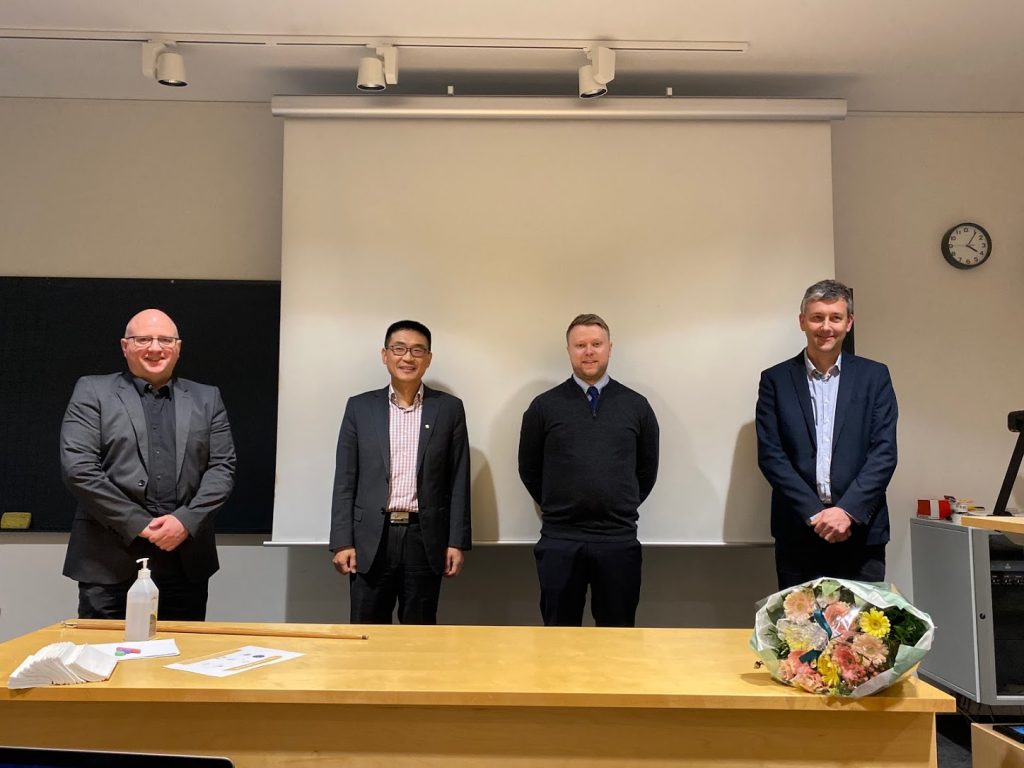
PhD Defense: March 19 – Lars Ivar Hatledal – NTNU Aalesund
Lars Ivar Hatledal has for his defense of the PhD degree at NTNU, handed in the following thesis:
“Protocols and Standard for Co-Simulation – For demanding maritime operations”
The opponents of the thesis are:
Associate Professor Tiina Komulainen, OsloMet, Norway
Professor Agris Nikitenko, Riga Technical University, Latvia
Associate Professor Henrique Gaspar, NTNU (Administrator)
The trial lecture took place on March 19, 2021, at 10:15 on the following topic: «Co-simulation toolbox – How to implement co-simulation in an industrial environment».
The actual defense took place on March 19, 2021, at 13:15.
Both the trial lecture and the defense were public.
The main supervisor has been professor Houxiang Zhang at NTNU Aalesund. Co-supervisors have been professor Geir Hovland at the University of Agder and university lektor Arne Styve at NTNU Aalesund.
ABSTRACT:
There is a strong demand for innovation and efficiency within operations, life cycle services, and design of maritime systems. Modern vessels operate increasingly autonomously through strongly interacting sub-systems. These systems are dedicated to a specific, primary objective of the vessel or may be part of the general essential ship operations. The sub-systems exchange data and make coordinated operational decisions, ideally without any user interaction. The task of designing, operating, and integrating life cycle services for such vessels is a complex engineering task that requires an efficient development approach, which must consider the mutual interaction between the inherent multi-disciplinary on-board sub-systems. Digitalization thus has become a key aspect of making the maritime industry more innovative, efficient, and fit for future operations.
However, no one simulation tool is suitable for all purposes and the plethora of modeling tools within different disciplines exists for very good reasons. Issues related to integration of heterogeneous systems and hardware, memory, and CPU utilization makes implementing complex-cyber-physical systems, like vessels, in a monolithic or centralized manner undesirable.
Co-simulation alleviates this issue, allowing different sub-systems to be modeled independently, but simulated together. Co-simulation refers to an enabling technique, where different sub-systems making up a global simulation are being modeled and run in a distributed fashion. Each sub-system is a simulator and is broadly defined as a black box capable of exhibiting behavior, consuming inputs, and producing outputs. A crucial point is that it allows users to simulate models exported from different tools in a unified manner. Compared to more traditional monolithic simulations, co-simulation encourages re-usability, model sharing, and fusion of simulation domains.
Co-simulation can be expanded into the realm of digital twins by feeding sensor data measured from the real world into the models, which in turn closes the loop by providing actionable feedback. A digital twin can be defined as a virtual representation of a physical asset enabled through data and simulators for real-time prediction, optimization, monitoring, controlling, and improved decision making. As the digital twin mimics its physical counterpart, it can be used to estimate a vessels performance before running any tests in the real world. This not only offers flexibility, but also cuts down costs to a great extent. These proxies of the physical world will help companies in the maritime industry in developing enhancements to existing products, operations, and services, and can even help drive business innovation.
This dissertation aims to drive adoption of co-simulation standards and development of use-cases by providing software that makes co-simulation simpler and more intuitive. This includes enabling technology for building standard-conforming models and systems, and subsequent tools for simulating them. The case studies presented show the effectiveness of the proposed approach.

